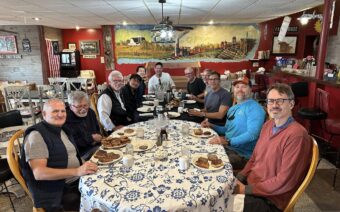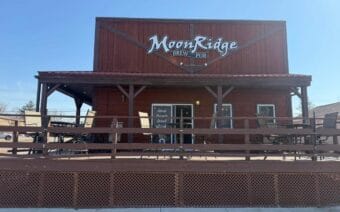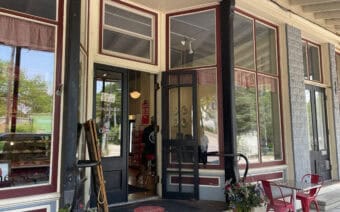
May 27, 2024
LA CROSSE – Sustainability and being attentive to the carbon footprint they leave behind is a topic of discussion for many businesses.
La Crosse Distilling Company, located at 129 Vine St., is one such company.
Co-owners Angela and Nick Weber said the company immerses itself in the full circle process of sustainability – intertwining themselves with the farming community while also committing to producing certified organic spirits and farm-to-table cuisine.
Nick said La Crosse Distilling Company’s operation – which opened its doors in 2018 – focuses on environmentally sustainable practices powered by geothermal systems.
“A lot of planning went into it, collaborating with small family farmers in the area,” he said. “We partnered with (them) to source the organic grains and raw ingredients and then repurpose our spent grains into feed for livestock. Further, we offer opportunities to repurpose spent barrels by partnering with local and regional breweries.”
Angela said the distillery’s relationship and mutual respect with area farmers lends itself to the full-circle business model.
“We work with family farmers in our area, and that is valuable for a couple of different reasons,” she said. “Partly because we are supporting local farmers, but we (also) have built in full circle sustainability benefits to their farm and our production.”
Every year, Nick said La Crosse Distilling Company does a calculation, and on average, the team repurposes 1.8 million pounds of waste.
“(The farmers) convert it into organic fertilizers and livestock feed,” he said. “That organic fertilizer is used to fertilize the soil and then used to grow the crops for production. It is a full circle process.”
Angela said the benefits of this process are multi-fold.

“First, we have the partnerships with family farms,” she said. “We are also part of an organization called Marbleseed, which is an organic, regenerative farming organization that works with all types of organic farmers in the regenerative sector.”
Angela said the real message is how customer-facing organizations and businesses can add value to working with organic farmers.
“Having business-to-consumer products, experiences and services are popping up in bringing organic farming to the customer,” she said.
Ideal location
The downtown La Crosse area, Nick said, has seen a resurgence recently, and he wanted to be a part of that.
“We wanted to give life back to the old,” he said. “Downtown La Crosse is older than the suburbia that surrounds the city, so we saw that as a natural spot. The site was a perfect spot on a corner in the bustling downtown and allowed us to do geothermal efficiently because of its proximity to the Mississippi River. Even though the river is not surfaced right by our building, it still runs underneath us and is a great resource we can tap into there. I believe every business should be using geothermal powered technology.”
Nick said his family’s motto has spilled over into his business philosophy.
“I believed what my grandfather told me and what my father told me: ‘Leave this place better than you found it,’” he said. “I have always been drawn to and have friends who are Native American and admire the way they value the land.”
La Crosse is geographically at the heart of the driftless region, Nick said, which gave rise to another premise upon which La Crosse Distilling Company has its business: “Driftless Pure.”
“Driftless Pure is our promise to use organic ingredients, employ sustainable practices and focus on authentic quality,” he said. “We partner with family farmers who share our values.”
Before La Crosse Distilling Co.
Though their leap into distilling started with La Crosse Distilling Company, the Webers said they are familiar with the industry – knowledge they obtained through their work in real estate development and restaurant hospitality.
Angela said her background is in marketing – therefore, she has spearheaded the distillery’s social media presence as its marketing director.

One of the greatest challenges La Crosse Distilling Company faces, she said, is educating customers and finding avenues in which to get their unique message out there.
“We focus on carving out an opportunity to tell our individual stories about our products,” she said. “We are not in the commodity market. We are more specialized. We are not trying to compete with spirits like Jack Daniels, for example.”
Angela said La Crosse Distilling Company focuses on creating products that tell a story of the West Central Wisconsin region.
“That comes through in the way in which we develop our products,” she said. “There are aspects of our products that lend themselves to being specialized, craft, small batch and more exclusive than a commodity product.”
Angela said they have been pleasantly surprised by the customers following La Crosse Distilling Company – which will mark its sixth anniversary this September – has created.
“It is a surprise to see how much loyalty and appreciation from our customers toward our products, especially once people try them,” she said. “Whenever we have a new product launch, many people reserve their bottles of spirits (in advance). There is a great demand for them. Hundreds of people come out to our product launches. They make time and space in their busy schedules to come and see us. Those are probably my personal highlights.”
Taking the leap
Nick said there are a million things that go into starting a distillery business, including researching, attending workshops and conferences across the country and visiting steel manufacturers.
“We needed the right design and construction teams, (so we) hired consultants from Denver, Colorado,” he said. “We needed the right engineers to work with us, as we wanted to use the geothermal system for the building and the distillation process.”

Nick said his why is fairly straightforward.
“I’ve always been enthralled by the (distilling) process,” he said. “I love mechanical systems and also saw the market (opportunities).”
Beyond the brick and mortar
Angela said the distribution of La Crosse Distilling Co. products extends beyond the city limits.
“We have distribution right now in Minnesota, Wisconsin, Illinois, Colorado, Nevada and California,” she said. “Distributor relationships pave the way for our products in grocery stores, liquor stores, restaurants and bars.”
There is an online presence for the products as well, Angela said.
“About a year and a half ago, we partnered with an e-commerce company to make online purchasing available on our website (lacrossedistilling.co),” she said.
Angela said the distillery also offers free shipping with a minimum purchase of $44, which usually equates to two bottles.
“Having online e-commerce capabilities allows us to extend our reach,” she said. “People come and visit our distillery or interact with our products one way or another. If they live outside of our distribution footprint, they can still order products.”
Angela said La Crosse Distilling Company leaned into the special events planning soon after the COVID-19 pandemic.
“We host events of all sizes,” she said. “One of our employees had a passion for it and started running with it after the pandemic lifted. We expanded that part of our team. We hired a sales manager for our events and sometimes (rent) out the entire building. We hold many events on the mezzanine level, which is a draw with its natural sunlight and greenery.”

Some of the events La Crosse Distilling Company plays host to, Angela said, include corporate events, rehearsal dinners and company holiday parties.
She said they also host organizations like the Sustainability Institute of La Crosse, which aligns with the distillery’s mission.
“On Make a Difference Monday, we partner with local organizations (and donate) to them based on sales that day,” she said. “These days are also an opportunity for organizations within our area to come through the space (so we can) show them what we have to offer.”
All hands on deck
Nick said La Crosse Distilling Company’s team consists of 36 full-time employees, but said that number can fluctuate during the holidays.
The 11,000-square-foot building houses the restaurant, tasting room and production areas.
The restaurant, Nick said, holds almost 200 patrons, with extended seating options on the outdoor patio in the warmer months.
Having a restaurant and a tasting room on-site, Nick said, was a strategic move.
“We wanted the customer experience to extend beyond the spirits but to include a food experience as well,” he said. “The restaurant opened simultaneously with the production piece.”
 Henning Cheese earns multiple first-place honors at 2025 cheese contest
Henning Cheese earns multiple first-place honors at 2025 cheese contest PetSkull Brewing – a force to be reckoned with in Manitowoc
PetSkull Brewing – a force to be reckoned with in Manitowoc







